|
|
|
Sort Order |
|
|
|
Items / Page
|
|
|
|
|
|
|
| Srl | Item |
| 1 |
ID:
072651
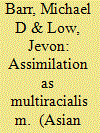

|
|
|
|
|
| Publication |
2005.
|
| Summary/Abstract |
The myths of meritocracy and multiracialism 'explain' between them both the 'fairness' of the Singapore system and the subordinate role of the non-Chinese minority races. They also purport to assure the minorities that they enjoy full status as members of the nation-building project and that their cultural and religious mores are embraced and protected within its framework. Using the Malay minority as its case study, and arguing from archival, oral, official government and secondary sources, this paper argues that the Singapore systems of meritocracy and multiracialism have not been concerned primarily with intercommunal tolerance since the 1970s, but are now programmes of assimilation of the racial minorities into a Chinese-dominated society.
|
|
|
|
|
|
|
|
|
|
|
|
|
|
|
|
| 2 |
ID:
144831
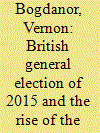

|
|
|
|
|
| Summary/Abstract |
Many on the left hoped that the 2015 general election in Britain would prove a social democratic moment. Instead, it proved a nationalist moment, since the only parties radically to increase their vote were UKIP and the SNP. This mirrored trends on the Continent, where nationalist parties on the right and the left have been the beneficiaries of the financial collapse of 2008. These parties exploit a new social cleavage between those who benefit from globalisation and those left behind. The new parties exploit issues of identity rather than economics, and these issues—whether Britain remains in the European Union, whether mass immigration continues and whether Scotland remains in the United Kingdom—are likely to dominate the 2015 parliament.
|
|
|
|
|
|
|
|
|
|
|
|
|
|
|
|
| 3 |
ID:
152317
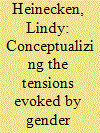

|
|
|
|
|
| Summary/Abstract |
The South African military has adopted an assertive affirmative action campaign to ensure that women are represented across all ranks and branches. This has brought about new tensions in terms of gender integration, related to issues of equal opportunities and meritocracy as well as the accommodation of gender difference and alternative values. The argument is made that the management of gender integration from a gender-neutral perspective cannot bring about gender equality, as it obliges women to conform to and assimilate masculine traits. This affects women’s ability to function as equals, especially where feminine traits are not valued, where militarized masculinities are privileged and where women are othered in ways that contribute to their subordination. Under such conditions, it is exceedingly difficult for women to bring about a more androgynous military culture espoused by gender mainstreaming initiatives and necessary for the type of missions military personnel are engaged in today.
|
|
|
|
|
|
|
|
|
|
|
|
|
|
|
|
| 4 |
ID:
118975
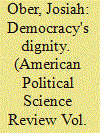

|
|
|
|
|
| Publication |
2012.
|
| Summary/Abstract |
Dignity, as equal high standing characterized by nonhumiliation and noninfantilization, is democracy's third core value. Along with liberty and equality, it is a necessary condition for collective self-governance. Dignity enables robust exercise of liberty and equality while resisting both neglectful libertarianism and paternalistic egalitarianism. The civic dignity required for democracy is specified through a taxonomy of incompletely and fully moralized forms of dignity. Distinctive features of different regimes of dignity are modeled by simple games and illustrated by historical case studies. Unlike traditional meritocracy and universal human dignity, a civic dignity regime is theoretically stable in a population of self-interested social agents. It is real-world stable because citizens are predictably well motivated to defend those threatened with indignity and because they have resources for effective collective action against threats to dignity. Meritocracy and civic dignity are not inherently liberal, but may persist within a liberal democracy committed to universal human dignity.
|
|
|
|
|
|
|
|
|
|
|
|
|
|
|
|
| 5 |
ID:
156666
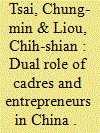

|
|
|
|
|
| Summary/Abstract |
By examining China’s state-monopolized industries, we explore the evolution of managerial behavior. With the party-state’s continued emphasis on meritocracy in elite management, managers of China’s state-owned enterprises play a hybrid role as both party cadres and business entrepreneurs. This also reflects the adaptability of the Chinese Communist Party in pursuing pro-market reform.
|
|
|
|
|
|
|
|
|
|
|
|
|
|
|
|
| 6 |
ID:
116581
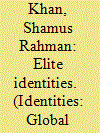

|
|
|
|
|
| Publication |
2012.
|
| Summary/Abstract |
Elites have changed. They are now more open and meritocratic. They are also the engines of inequality. In this article, I argue that elites have embraced the rhetoric of the rights movements of the past decades, becoming champions of the notion that it is individual capacities that matter, not ascriptive characteristics. This stance embraces a new efficiency of our world, that of the market. The earnest deployment of these ideas by the elite has resulted in a world with less equality, less mobility and a more empowered elite. I reflect on how this came to be, and how such elite identities might be challenged in the service of the public welfare.
|
|
|
|
|
|
|
|
|
|
|
|
|
|
|
|
| 7 |
ID:
153301
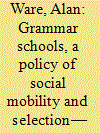

|
|
|
|
|
| Summary/Abstract |
Initially, four plausible reasons for introducing selection in secondary education are examined, three of which are irrelevant to contemporary debates about expanding grammar-school education. These are: first, to ration education in less advanced economies; second, to increase the supply of skilled labour within an expanded national elite; third, as part of a ‘segmented’ system of education. A fourth—increasing upward social mobility—is open to two objections: first, the May government's proposals are so limited as to have little likely impact on mobility and, second, upward mobility in the twentieth century was possible only because of structural change in the British labour market, and that will probably not continue in this century. Finally, it is argued that attempts to select the ‘best’ in any activity or skill are necessarily highly imperfect, and are far less accurate than testing who does and does not meet some minimum level of competence.
|
|
|
|
|
|
|
|
|
|
|
|
|
|
|
|
| 8 |
ID:
174004
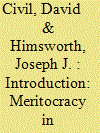

|
|
|
|
|
| Summary/Abstract |
Sixty years after its publication, Michael Young’s The Rise of the Meritocracy remains one of the most important texts for understanding the changing intellectual politics of postwar Britain. Young’s fictional vision of a meritocratic society explores the consequences of a society where each citizen is judged according to the formula ‘I.Q. + Effort = Merit’. The successful meritocrats hoard ever‐greater rewards for themselves, crystallising into a rigid and repressive elite who rule over an increasingly powerless and depressed underclass. While the concept has evolved and adapted, the language of meritocracy is one of the great survivors of postwar British politics. In an age characterised by the rise of populist leaders and movements, as well as a backlash against educated ‘liberal elites’, revisiting, reinterpreting and re‐evaluating Young’s influential satire and the central place the concept of meritocracy occupies in the history of postwar Britain has never been more important.
|
|
|
|
|
|
|
|
|
|
|
|
|
|
|
|
| 9 |
ID:
130948
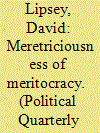

|
|
|
|
|
| Publication |
2014.
|
| Summary/Abstract |
Meritocracy has become the creed of all three British political parties. There is a consensus that progress towards it has stalled. In fact, it is doubtful how widespread the advance to meritocracy ever was and how far short of achieving it Britain fell. In any case, meritocracy, if it is not accompanied by greater equality of outcome, would not promote a happier society. It would make the rich more unrestrained in their greed and the poor more miserable thinking their poverty their own fault.
|
|
|
|
|
|
|
|
|
|
|
|
|
|
|
|
| 10 |
ID:
167487
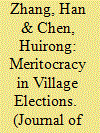

|
|
|
|
|
| Summary/Abstract |
Local governments in China face a fundamental ‘democracy dilemma’ in rural governance: although elected village cadres may not be capable or controllable, local governments cannot change or abolish village self-government, as enshrined in China’s Constitution and the national laws. However, there has recently been a new way of dealing with this dilemma for local governments: called the ‘Separation of Election and Employment’ (xuan pin fenli, SEE) [of village cadres]. Based on an in-depth case study of a Zhejiang county, this article argues that SEE is a typical type of institutional layering, which adds a new meritocratic village cadre management system onto existing village democracy. This is a path-dependent institutional change, emulating the Chinese Communist Party’s nomenklatura and bianzhi systems. This research has broader implications concerning gradual institutional change and political meritocracy.
|
|
|
|
|
|
|
|
|
|
|
|
|
|
|
|
| 11 |
ID:
174007
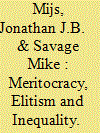

|
|
|
|
|
| Summary/Abstract |
The appeal of meritocracy is plain to see, because it appears to promote equality of opportunity. However, in this paper we argue that meritocracy is also a deeply elitist project. Firstly, we place Michael Young in context to show how his critique of meritocracy should be understood as a socialist vision to ameliorate class divides. Secondly, we show how economic inequality in the UK has not generated systematic resistance: in fact, inequality and belief in meritocracy have gone hand in hand. Thirdly, we argue that people see their own lives as meritocratic rather than ascribed, and that such values are deeply embedded in popular life. We offer two explanations for how such views have come about, and show how they have helped construct a more unequal society.
|
|
|
|
|
|
|
|
|
|
|
|
|
|
|
|
| 12 |
ID:
163667
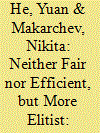

|
|
|
|
|
| Summary/Abstract |
This paper examines the concept and practice of meritocracy in Chinese national oil corporations’ (NOCs) graduate recruitment and selection. It focuses on the post-2008 NOC reform period, which sees NOCs place increasing rhetorical emphasis on meritocratic or ‘fair’ recruitment and selection. However, this paper argues that, in practice, these sentiments remain unrealized. The NOCs continue to use some sub-optimum applicant assessment measures and misuse or misunderstand the more optimum ones. Likewise, the prioritization of certain criteria, such as elite education, has merely advantaged graduates with strong Bourdieu capitals. Hence, this produces a flawed meritocracy that neither maximizes fairness nor efficiency, but strengthens elitism. Moreover, its capacity to serve political interests is questionable too. These insights, then, enhance existing academic debates over China’s engagement with meritocracy.
|
|
|
|
|
|
|
|
|
|
|
|
|
|
|
|
| 13 |
ID:
188579
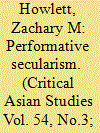

|
|
|
|
|
| Summary/Abstract |
This article examines the role of religion in China’s National College Entrance Exam, the Gaokao. In Chinese schools, religion is officially banned and branded superstition. But some Gaokao-preparatory high schools sponsor pilgrimages to pray for exam success, invite ritualists to exorcize ghosts, and tolerate discussions of karmic merit, euphemistically termed “character” (renpin). Based on two years of ethnographic fieldwork in rural and urban schools in Fujian Province, this article argues that such practices help people maintain self-efficacy while revealing secularism to be a performance. Hypercompetition in the post-Mao era (1977–present) has created a perceived disconnect between effort and reward, and to restore that balance, people appeal to local gods and cosmic reciprocity. But elites must pay deference to secular ideals while quietly pursuing local practices in what sociologist Erving Goffman terms the backstage. Such Janus-faced obeisance has analogs in the imperial era. By analyzing secularism as a performance with early modern genealogies, this article advances understanding of Chinese regime legitimacy, adds to ethnographies of secularism’s lived experience in Asia, and helps to account for why popular religion continues to flourish despite more than a century of suppression.
|
|
|
|
|
|
|
|
|
|
|
|
|
|
|
|
| 14 |
ID:
174008
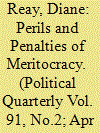

|
|
|
|
|
| Summary/Abstract |
This article deploys insights from Michael Young’s 1958 satire The Rise of the Meritocracy to challenge the dominant ideology of meritocracy in contemporary British society. It draws on ethnographic research in schools over a twenty‐five year period to illustrate the damage the illusion of meritocracy inflicts on children and young people, but particularly those from working class backgrounds. It argues that the consequences of the pretence of meritocracy are to be found in everyday practices of testing, hyper‐competition and setting, and beyond the classroom in the designation of predominantly working class schools as ‘rubbish schools for rubbish learners’. It concludes that, beyond the negative consequences for working class learners, there are wider consequences for British society, exacerbating social divisions and encouraging the growth of distrust, prejudice, envy, resentment, and contempt between different social groups.
|
|
|
|
|
|
|
|
|
|
|
|
|
|
|
|
| 15 |
ID:
133934
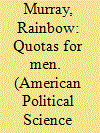

|
|
|
|
|
| Publication |
2014.
|
| Summary/Abstract |
Gender quotas traditionally focus on the underrepresentation of women. Conceiving of quotas in this way perpetuates the status of men as the norm and women as the "other." Women are subject to heavy scrutiny of their qualifications and competence, whereas men's credentials go unchallenged. This article calls for a normative shift in the problem of overrepresentation, arguing that the quality of representation is negatively affected by having too large a group drawn from too narrow a talent pool. Curbing overrepresentation through ceiling quotas for men offers three core benefits. First, it promotes meritocracy by ensuring the proper scrutiny of politicians of both sexes. Second, it provides an impetus for improving the criteria used to select and evaluate politicians. Third, neutralizing the overly masculinized environment within parliaments might facilitate better substantive and symbolic representation of both men and women. All citizens would benefit from these measures to increase the quality of representation.
|
|
|
|
|
|
|
|
|
|
|
|
|
|
|
|
| 16 |
ID:
192192
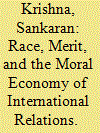

|
|
|
|
|
| Summary/Abstract |
International Relations (IR) as a discipline explains the fact of global inequality through a discourse of meritocracy. In the early decades of the discipline, such explanations were explicitly racial, and justified empire and Western dominance on the basis of their innate superiority over the rest of the world. In later and in contemporary times, such racialized explanations for inequality have been replaced by ostensibly merit-based explanations that turn out, on closer examination, to replicate the inner logic and exclusionary claims of earlier ones. The notion of meritocracy has been a key element in the ideological appeal of IR as a discourse to elites and aspiring middle classes central to nation-building efforts in the global South. This latter fact complicates efforts that equate decolonizing the discipline with the promotion of diversity in its membership and the widening of its empirical and theoretical concerns. Central to any notion of a genuinely decolonial IR must be an attack on the very idea of merit as explaining and justifying international and domestic inequality.
|
|
|
|
|
|
|
|
|
|
|
|
|
|
|
|
| 17 |
ID:
115213
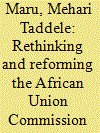

|
|
|
|
|
| Publication |
2012.
|
| Summary/Abstract |
Recently, in July 2012, the high-profile and bitterly fought nine-month race for the post of Chair of the African Union (AU) Commission, between Dr Jean Ping of Gabon, and his main challenger, Dr Nkosazana Dlamini-Zuma, culminated in the latter's victory. Her victory came after the deadlock at the Eighteenth AU Summit in January 2012. Borne out of the considered need for a quick fix through reliance on a vote of expediency, the election of Dr Dlamini-Zuma represented a political resolution to the crisis that arose due to the earlier ongoing electoral deadlock. Far from being a competitive election by design, the 2012 AU Commission election by default became transformed into an intensely fought campaign that put the AU in the limelight. This article briefly introduces the electoral process, explains in detail the voting behaviour of AU member states, and offers five specific reasons for the victory of Dr Dlamini-Zuma. On the surface the election looks very competitive, but the article explains why this is not the case. To create greater competition for these posts, the AU needs to overhaul the nomination process and the voting procedure. In this regard, the article proffers detailed analysis and proposes a radical revision of the existing criteria for the nomination. The article also proposes specific recommendations for the amendment of the rules of procedure of the AU Assembly to allow for a qualified majority as a deadlock breaker in the fifth round. It also assesses whether the integrity of the AU Commission election was damaged during the campaigning and voting process. In this regard, it recommends the development of a code of conduct for future elections at the AU.
|
|
|
|
|
|
|
|
|
|
|
|
|
|
|
|
| 18 |
ID:
122360
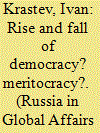

|
|
|
|
|
| Publication |
2013.
|
| Summary/Abstract |
The paradox of the modern world is that democratization of society has ironically led to voters' loss of power and the rise of social inequality while globalization liberated the elites but deprived them of legitimacy and capacity to govern.
|
|
|
|
|
|
|
|
|
|
|
|
|
|
|
|
| 19 |
ID:
118930
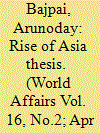

|
|
|
| 20 |
ID:
174006
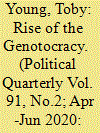

|
|
|
|
|
| Summary/Abstract |
This article examines whether meritocracy is an effective device for legitimising socioeconomic inequality. It looks at two ways in which it could be said to do that—by allocating wealth and prestige according to merit, and by creating opportunities for those born in low income families—and concludes that the first only creates the appearance of fairness (an argument made persuasively by John Rawls) and the second is a largely unfulfilled promise. The author asks whether the low levels of social mobility in Britain and America are because they have not yet become fully‐fledged meritocracies, or because they have, and considers Richard Herrnstein and Charles Murray’s argument in The Bell Curve that meritocratic societies have a tendency to degenerate into genetically‐based caste systems. It examines the research by Dalton Conley, Jason Fletcher and Benjamin Domingue on this point, which shows that genetic assortative mating declined over the course of the twentieth century, and tentatively concludes that Herrnstein and Murray were wrong—that flatlining social mobility is a bug, not a feature, of meritocratic societies.
|
|
|
|
|
|
|
|
|
|
|
|
|
|
|
|
|
|
|
|
|